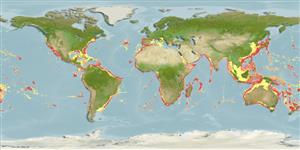Teleostei (teleosts) >
Beryciformes (Sawbellies) >
Berycidae (Alfonsinos)
Etymology: Beryx: Greek, beryx or berys = a name of a fish. Cuvier & Valenciennes (1829:221) precise that the name was used by Gesner from Varinus, but with no indication whatsoever helping identifying any species. After D'Arcy Wentworth Thompson (A glossary of Greek fishes, 1947), the name actually seems to come originally from Hesychius, but perhaps the name was not originally a fish name. Thompson compares it to meryx (ruminant), applied on skaros (Scarus), so it may have been applied on a parrot fish referring to its browsing/grazing behavior described by Aristoteles and followers..
More on author: Lowe.
Environment: milieu / climate zone / depth range / distribution range
Ecology
Marine; benthopelagic; depth range 25 - 1300 m (Ref. 9833), usually 400 - 600 m (Ref. 27121). Subtropical; 45°N - 43°S, 180°W - 180°E
Circumglobal, excluding the northeast Pacific and Mediterranean Sea (Ref. 9833). Western Atlantic: Gulf of Maine to the Gulf of Mexico (Ref. 6743). Eastern Atlantic: off southwestern Europe and the Canary Islands (Ref. 7413) to South Africa (Ref. 4179). Indo-Pacific: East Africa (including Saya de Malha Bank, Ref. 33390) to Japan, Hawaii, Australia, and New Zealand (Ref. 5755). The limited number of records in the western Pacific is doubtless the result of limited fishing effort below 200 m (Ref. 9833). Eastern Pacific: Chile (Ref. 27363).
Length at first maturity / Size / Weight / Age
Maturity: Lm 33.2 range ? - ? cm
Max length : 70.0 cm TL male/unsexed; (Ref. 30573); common length : 40.0 cm TL male/unsexed; (Ref. 30573); max. published weight: 4.0 kg (Ref. 43448); max. reported age: 23 years (Ref. 35874)
Dorsal spines (total): 4; Dorsal soft rays (total): 13 - 16; Anal spines: 4; Anal soft rays: 26 - 30. First infraorbital bone with a spine projecting laterally on anterior end. Lateral line extends to caudal fin. A fleshy disk on inner face of exposed area of scale. In young fishes, the 2nd dorsal ray is elongate (Ref. 559). Ref. 27363 notes pectoral fins with one spine and 17 soft rays (Ref. 27363).
Adults inhabit the outer shelf (180 m) and slope to at least 1,300 m depth, probably moving further from the bottom at night; often found over seamounts (Ref. 9833) and underwater ridges (Ref. 33648). Juveniles pelagic (Ref. 9072). Feed mainly on fish, crustaceans and cephalopods (Ref. 33648). Oviparous, spawn in batches (Ref. 30291). Eggs and larvae are pelagic (Ref. 30291). Marketed frozen and eaten steamed, fried, broiled, boiled, microwaved and baked (Ref. 9988).
Spawning occurs about 10 to 12 times at intervals of about 4 days during the breeding season (Ref. 58433).
Maul, G.E., 1990. Berycidae. p. 626. In J.C. Quero, J.C. Hureau, C. Karrer, A. Post and L. Saldanha (eds.) Check-list of the fishes of the eastern tropical Atlantic (CLOFETA). JNICT, Lisbon; SEI, Paris; and UNESCO, Paris. Vol. 2. (Ref. 7413)
IUCN Red List Status (Ref. 130435)
Threat to humans
Harmless
Human uses
Fisheries: commercial
Tools
Special reports
Download XML
Internet sources
Estimates based on models
Preferred temperature (Ref.
123201): 6.6 - 12.9, mean 9.2 °C (based on 569 cells).
Phylogenetic diversity index (Ref.
82804): PD
50 = 0.6260 [Uniqueness, from 0.5 = low to 2.0 = high].
Bayesian length-weight: a=0.01514 (0.01153 - 0.01986), b=3.05 (2.97 - 3.13), in cm total length, based on LWR estimates for this species (Ref.
93245).
Trophic level (Ref.
69278): 4.3 ±0.2 se; based on diet studies.
Generation time: 7.5 (6.2 - 8.3) years. Estimated as median ln(3)/K based on 15
growth studies.
Resilience (Ref.
120179): Low, minimum population doubling time 4.5 - 14 years (K=0.10-0.18; tm=5-7.5; tmax=23; Fec = 270,000).
Prior r = 0.28, 95% CL = 0.19 - 0.42, Based on 1 data-limited stock assessment.
Fishing Vulnerability (Ref.
59153): High vulnerability (59 of 100).
Climate Vulnerability (Ref.
125649): High vulnerability (58 of 100).
Nutrients (Ref.
124155): Calcium = 30.7 [9.0, 106.2] mg/100g; Iron = 0.746 [0.364, 1.431] mg/100g; Protein = 17.8 [16.7, 19.0] %; Omega3 = 0.472 [0.193, 1.101] g/100g; Selenium = 52.9 [26.3, 104.7] μg/100g; VitaminA = 26.8 [9.1, 86.8] μg/100g; Zinc = 0.553 [0.382, 0.825] mg/100g (wet weight);
